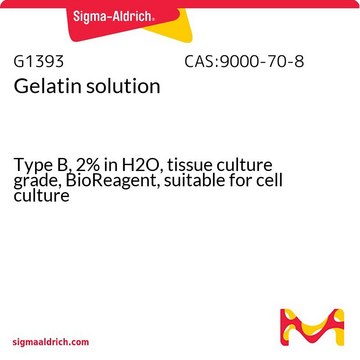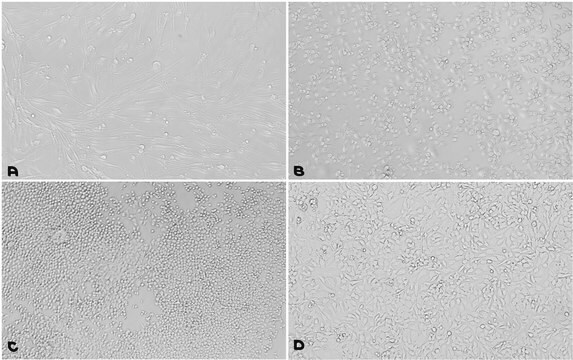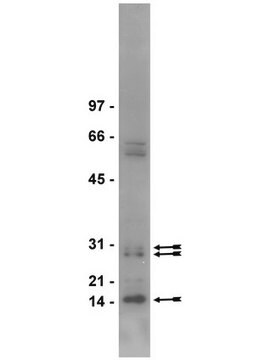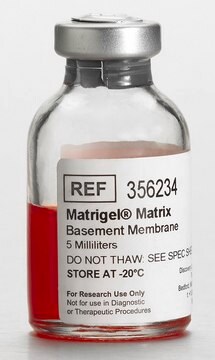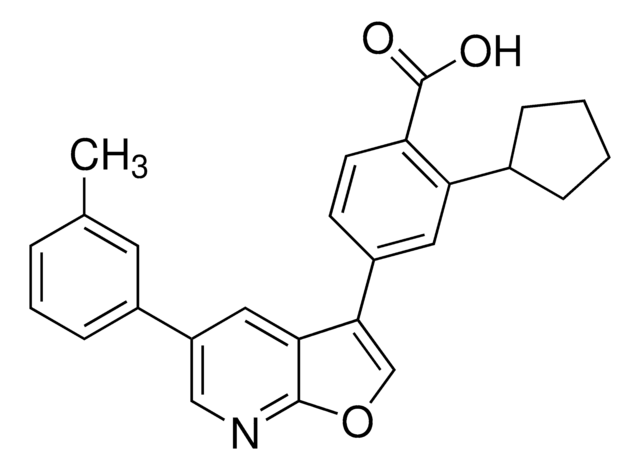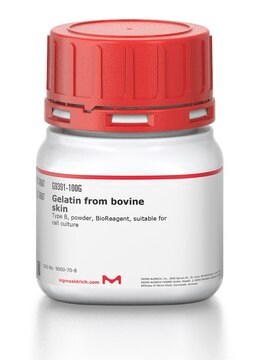R304-05A
Rat Aortic Endothelial Cells: RAOEC, adult
Sinonimo/i:
RAOEC cells
Autenticatiper visualizzare i prezzi riservati alla tua organizzazione & contrattuali
About This Item
Codice UNSPSC:
41106514
NACRES:
NA.81
Prodotti consigliati
Origine biologica
rat aorta (adult)
Confezionamento
pkg of 500,000 cells
Produttore/marchio commerciale
Cell Applications, Inc
Modalità di accrescimento
Adherent
Morfologia
Endothelial
tecniche
cell culture | mammalian: suitable
Malattie correlate
diabetes; cardiovascular diseases
Temperatura di conservazione
−196°C
Descrizione generale
Lot specific orders are not able to be placed through the web. Contact your local sales rep for more details.
RAOEC from Cell Applications, Inc. provide a useful model system to study many aspects of cardiovascular function and disease. Co-culture of the artery endothelial cells with species-matched smooth muscle cells provides an ideal model for studying the interaction between these two cell types.
RAOEC from Cell Applications, Inc. have been utilized in a number of research publications to:
Additionally, RAOEC from Cell Applications, Inc. were used to investigate the reasons for differential effects of Intermedin (IMD) on permeability of endothelial cells from different vascular beds (Aslam, 2011). Specifically, it was shown that IMD increased permeability of rat coronary microvascular endothelial cells by inducing loss of VE-cadherin from cel-cell junctions, but it reduced permeability of RAOEC and HUVECs because in those cell types IMD instead caused accumulation of VE-cadherin in cell-cell junctions. These differential effects of IMD on VE-cadherin are explained by the fact that, although IMD activates cAMP/PKA and inhibits RhoA/ROCK pathways leading to rearrangement of actin in both cell types, it only causes downstream Rac1 inhibition in rat coronary microvascular endothelial cells, but not in RAOEC or HUVEC. These results highlight the fundamental differences between endothelial cells from different vascular beds and/or microvascular vs. macrovascular endothelia.
RAOEC from Cell Applications, Inc. provide a useful model system to study many aspects of cardiovascular function and disease. Co-culture of the artery endothelial cells with species-matched smooth muscle cells provides an ideal model for studying the interaction between these two cell types.
RAOEC from Cell Applications, Inc. have been utilized in a number of research publications to:
- Investigate critical signaling pathways and mechanisms relevant to proper endothelial function, such as angiogenesis, proliferation, permeability, and search for beneficial modulators for therapeutic use (Sorensen, 2008; Liu, 2009; Makino, 2009; Masuda, 2012; Gros, 2013; Nguen, 2013)
- Elucidate molecular mechanisms of various cardiovascular risk factors, including those associated with diabetes, polycystic kidney disease, treatment for allograft rejection and vascular ER stress (Makino, 2008; Chiasson, 2011, Ren, 2011; Padilla, 2013)
- Provide a gold standard control for endothelial markers vWF and PECAM/CD31 expression (Hanley, 2008; Imamura, 2010)
- Develop drug delivery system for thrombolytic treatment (Mei, 2010)and methods for cardiac regeneration (Lionetti, 2010); design better vascular implants (Ibrahim, 2008; Yao, 2008; Duffy, 2011) and bone tissue engineering (Hamid, 2014)
Additionally, RAOEC from Cell Applications, Inc. were used to investigate the reasons for differential effects of Intermedin (IMD) on permeability of endothelial cells from different vascular beds (Aslam, 2011). Specifically, it was shown that IMD increased permeability of rat coronary microvascular endothelial cells by inducing loss of VE-cadherin from cel-cell junctions, but it reduced permeability of RAOEC and HUVECs because in those cell types IMD instead caused accumulation of VE-cadherin in cell-cell junctions. These differential effects of IMD on VE-cadherin are explained by the fact that, although IMD activates cAMP/PKA and inhibits RhoA/ROCK pathways leading to rearrangement of actin in both cell types, it only causes downstream Rac1 inhibition in rat coronary microvascular endothelial cells, but not in RAOEC or HUVEC. These results highlight the fundamental differences between endothelial cells from different vascular beds and/or microvascular vs. macrovascular endothelia.
Origine della linea cellulare
Aorta
Applicazioni
Cardiovascular function, studies on immune system and graft rejection, development of 3D endothelialized engineered tissues, drug discovery, stent-graft compatibility testing.
Componenti
Rat Endothelial Cell Basal Medium that contains 10% FBS and 10% DMSO
Qualità
Each lot was tested for proper morphology, Population Doublings, Negative for HIV, Hepatitis B, Hepatitis C, mycoplasma, bacteria, and fungi.
Nota sulla preparazione
- 3rd passage, >500,000 cells in Rat Endothelial Cell Basal Medium that contains 10% FBS and 10% DMSO
- Can be cultured at least to 6th passage
Mantenimento delle subcolture
Please refer to the RAOEC Culture Protocol.
Codice della classe di stoccaggio
10 - Combustible liquids
Classe di pericolosità dell'acqua (WGK)
WGK 1
Punto d’infiammabilità (°F)
Not applicable
Punto d’infiammabilità (°C)
Not applicable
Scegli una delle versioni più recenti:
Certificati d'analisi (COA)
Lot/Batch Number
It looks like we've run into a problem, but you can still download Certificates of Analysis from our Documenti section.
Se ti serve aiuto, non esitare a contattarci Servizio Clienti
Possiedi già questo prodotto?
I documenti relativi ai prodotti acquistati recentemente sono disponibili nell’Archivio dei documenti.
Mikhail A Kaplan et al.
Journal of biomaterials science. Polymer edition, 31(11), 1405-1420 (2020-04-24)
The novelty of the work lies in the creation and study of the physical and biological properties of biodegradable polymer coatings for stents based on poly(lactic-co-glycolic acid) (PLGA). Polymer coatings are capable of prolonged and directed release of molecules with
Il team dei nostri ricercatori vanta grande esperienza in tutte le aree della ricerca quali Life Science, scienza dei materiali, sintesi chimica, cromatografia, discipline analitiche, ecc..
Contatta l'Assistenza Tecnica.
